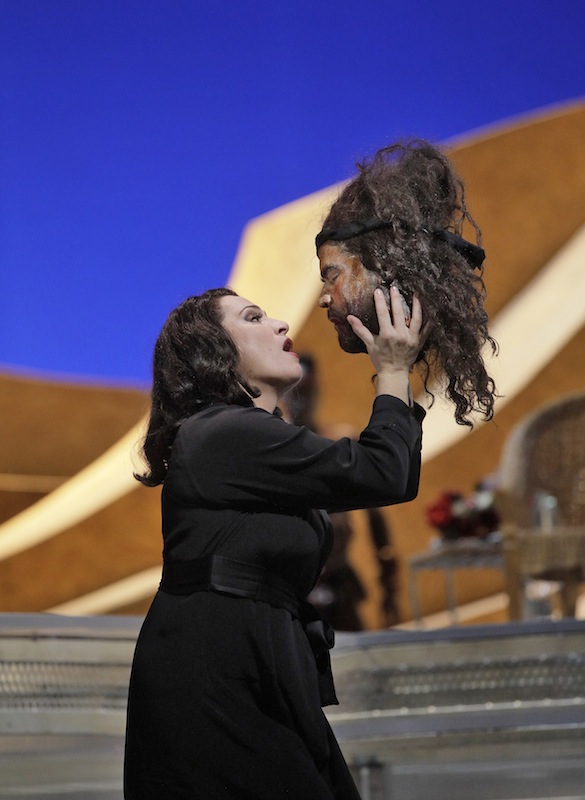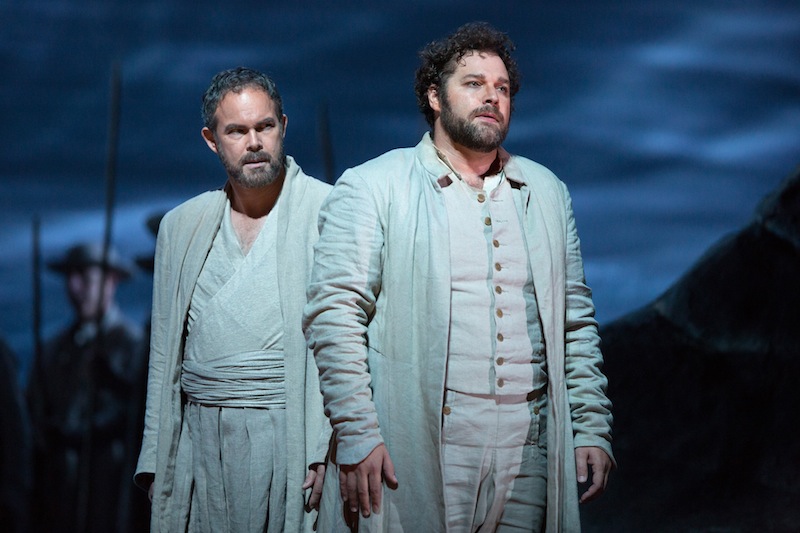A riveting Racette ignites in Met’s “Salome”

Patricia Racette stars in Richard Strauss’s “Salome” at the Metropolitan Opera. Photo: Ken Howard
It is one of the defining features of live performance that it continues to surprise us. To be an informed listener and attend a concert or an opera without expectations is just about impossible—and those experiences that shatter expectations are often the most rewarding of all.
Patricia Racette provided just that kind of rare experience, starring in a revival of Richard Strauss’s Salome at the Metropolitan Opera. She was not even originally scheduled to sing in this run, and stepped in to replace an ailing Catherine Naglestad.
Yet the veteran soprano had a career night Monday, showing she still has an enormous amount to offer, both musically and dramatically, as an artist. Racette has not had a success at the Met like this in several years–maybe ever.
A wobble or two could be heard on high notes in the early going, but Racette quickly settled into a secure, penetrating soprano. Salome is not the sort of role that requires vocal perfection—it requires dramatic conviction, captivating presence, and raw, visceral vocal power, all of which she had in spades. Her harrowing intensity and consistently direct singing were a service to Strauss’s work, and made this a heart-racing performance to watch.
Salome’s is not an easy arc to portray. The dramatic action of the opera takes place in a relatively short time, but even so her journey to psychotic breakdown, fueled first by her rejection at the hands of Jochanaan and then by her stepfather’s lecherous abuse, is a long one, and requires constant focus.
Racette maintained formidable presence throughout and was riveting from first to last. Her performance of the famous “Dance of the Seven Veils” was itself a dramatic feat, elegantly styled and fluid choreographed by Doug Varone, pulsing with eroticism.
That strain of the erotic only magnified the deep pathos of the final scene. Salome’s monologue, as she caresses the head of the prophet who spurned her, is a “Liebestod” of sorts, inviting death through dark amorous obsession. Racette’s account was exquisitely crafted, terrifying as she exulted in her grim triumph. Even in these last moments, the bright power of her voice showed no signs of fatigue, and her glimpses of rapture elicited a particular kind of horror—we saw, even in the darkest instant, a sad kind of innocence, a naive love that became a ruinous obsession.
Racette’s was not the only outstanding vocal performance from Monday’s cast. Željko Lučić was in superb voice as John the Baptist, bringing rich, dark color to the music as he seethed with disdain. There was roughness to his singing at times, but he found real authority and majesty in his monologue, striking a chilling note of dread as he spat his curse, “Du bist verflucht,” at the princess.
Strutting spitefully as Herod, Gerhard Siegel showed a forceful, aggressive tenor. Though he barked in spots, when he set his mind to it he could bellow forth clear, ringing pitches, and blazing lyrical lines. He was an easy character to revile, clapping his hands and licking his chops, Hutt-like, during Salome’s dance. But as the stakes became more urgent his intensity rose to match, trying desperately to dissuade his step-daughter from her grisly demand for the Baptist’s head.
Mikhail Petrenko brought a strong, woody bass in his cameo as the First Nazarene, while Kang Wang made an impressive debut, flashing a ringing tenor as the guard captain Narraboth.
There is an inescapable hint of Ian Fleming in Jürgen Flimm’s 2004 production—a portly, Nehru-collared villain hosting a black-tie cocktail party at his secret lair among the dunes of a Middle Eastern Desert, surrounded by armed guards. And yet it works, oddly creating a compelling setting for the moral shock on which the drama rests. The staging is a bit unkind to Herodias, who is forced to spend much of her time stumbling drunkenly about, but Nancy Fabiola Herrera made the best of it, finding a sympathetic note under the imperious trappings.
Though just a hundred minutes, Salome is no easy conducting assignment. Johannes Debus made an excellent impression in his company debut, leading a tight, disciplined performance of this difficult score. One might have wished for a little more abandon, more Straussian sumptuousness in the most heavily string-laden passages. But when it came to communicating the essential character of the piece, Debus was right on the mark, finding thrilling tension in the lean, hard edges of the score.
Revivals like this one, featuring performances so fresh, don’t come around every week, or even every season—opera lovers would be wise to rush to the box office.
Salome runs through December 28 at the Metropolitan Opera. metopera.org
Salome, Metropolitan Opera, New York — review
Jürgen Flimm’s production is silly, but there are substantial musical compensations

Strauss’s Salome came back to the Met on Monday, unfortunately in Jürgen Flimm’s silly production, introduced back in 2004. Santo Loquasto’s incongruously modern costumes added nothing to narrative comprehension, and his awkward set remained an obstacle course for the agitated participants. Weird, winged, black-robed figures observed the show silently from a side-stage mountain, and John the Baptist used a clunky yet convenient elevator to ascend from his cistern. Ask not why.
Sample the FT’s top stories for a week
You select the topic, we deliver the news.
A new cast did what it could under the circumstances, and the great Met orchestra, led by Johannes Debus of the Canadian Opera, made a mighty if sometimes raucous noise. Subtle instrumental nuances proved scarce.
Still, one could savour vital individual compensations. The evening belonged, rightly, to Patricia Racette, who portrayed the princess of Judea in place of Catherine Naglestad, reportedly unwell in Europe. Racette, 51, rose to the challenge with gutsy abandon, singing with almost unflagging power and inflecting the text with illuminating stresses. She manoeuvred the cluttered stage with grace, and, yes, bared all for a brief moment as she discarded her seventh veil.
Željko Lučić, her forceful Jochanaan, sounded a bit gruff when onstage and suffered bad miking when off. Despite modest vocal means, Kang Wang exuded sympathy as the lovesick Narraboth, and Nancy Fabiola Herrera flounced neatly as a giddy Herodias.
Most remarkable was Gerhard Siegel, who exulted in the desperate pomposity of Herod. A uniquely versatile artist, he dominated the stage with contradictory qualifications: the persona of a busy buffo and the tone of an authentic Heldentenor. It is intriguing, if not surprising, to read in the programme booklet that his Ringrepertory includes both the heroic Siegfried and the pathetic Mime.
Personal nostalgia: in the bad old days, the Met felt Strauss’s 100-minute depiction of love, horror and climactic lust was insufficient for a night at the opera. While still a precocious youth, this incipient aficionado witnessed Salome for the first time, in Boston, coupled with Puccini’s comical Gianni Schicchi. Strange billfellows indeed.

To December 28, metopera.org
&&&&&&&&&&&&&&&
&&&&&&&&&&&&&&&
[Met Performance] CID:356554
Salome {158} Metropolitan Opera House: 12/05/2016., Metropolitan Opera Radio Sirius XM channel 74 Broadcast live
Streamed at metopera.org
(Debuts: Johannes Debus, Kang Wang, Nicholas Brownlee
Broadcast/Streamed)
Salome {158} Metropolitan Opera House: 12/05/2016., Metropolitan Opera Radio Sirius XM channel 74 Broadcast live
Streamed at metopera.org
(Debuts: Johannes Debus, Kang Wang, Nicholas Brownlee
Broadcast/Streamed)
Metropolitan Opera House
December 5, 2016 Broadcast/Streamed
SALOME {158}
Richard. Strauss-Oscar. Wilde/Hedwig Lachmann
Salome..................Patricia Racette
Herod...................Gerhard Siegel
Herodias................Nancy Fabiola Herrera
Jochanaan...............Zeljko Lucic
Narraboth...............Kang Wang [Debut]
Page....................Carolyn Sproule
Jew.....................Allan Glassman
Jew.....................Mark Schowalter
Jew.....................Noah Baetge
Jew.....................Alex Richardson
Jew.....................Devid Crawford
Nazarene................Mikhail Petrenko
Nazarene................Paul Corona
Soldier.................Nicholas Brownlee [Debut]
Soldier.................Richard Bernstein
Cappadocian.............John Hancock
Slave...................Kathryn Day
Executioner.............Reginald Braithwaite
Conductor...............Johannes Debus [Debut]
Production..............Jürgen Flimm
Designer................Santo Loquasto
Lighting designer.......James F. Ingalls
Choreographer...........Doug Varone
Broadcast live on Metropolitan Opera Radio Sirius XM channel 74
Streamed at metopera.org


